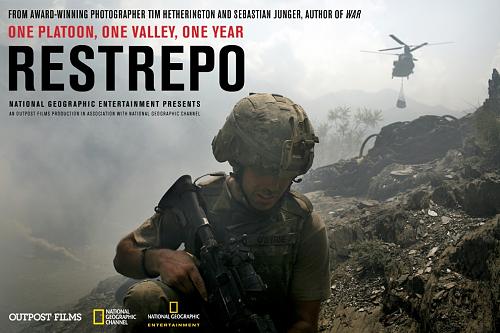By Philip Giraldi

I have been hearing about the National Geographic documentary Restrepo for some time, though I only had a chance to view it last week. The ninety-minute film and a book based on the documentary describe the experiences of a platoon of US Army soldiers from the 173rd Airborne Infantry in the Korengal Valley of Afghanistan from May 2007 until July 2008. The various military and intelligence focused websites that I peruse on a daily basis have been discussing Restrepo from a number of points of view. Some criticized both the tactics and strategies employed by the army command, noting the futility of posting small units deep in enemy controlled territory. Other sites more frequently visited by Vietnam era veterans criticized the soldiers themselves, noting that they were a far different breed than the citizen soldiers doing their duty but yearning to get out of the army back in the sixties and seventies. They find it hard to relate to the new breed. For some, today’s soldiers are volunteers who suffer from a “lack of introspection.” The troops see themselves as professionals with the shooting and killing part of a job that has to be done, though it is interesting to note how traumatized several of them became after their tour of duty, as reported in the documentary.
Restrepo was filmed by a team of two who spent a year with the soldiers on Forward Operating Base Restrepo, a vulnerable army outpost occupying a high point in the Korengal Valley, close to the Pakistani border. Sebastian Junger, who wrote The Perfect Storm, authored the book that came out of the experience and was also involved in the filming. Restrepo is shown at intervals on the National Geographic Channel on cable and satellite and is also available on DVD. I have noted that it is now on Red Box at $1 a pop for a rental.
Restrepo has no plot or story line. Though it seemed to me that it is careful not to take any position on Afghanistan or on the war itself that conclusion might be the result of careful and deliberately ambiguous editing. I note, for example, that many of the laudatory comments on the book and film on Amazon are essentially pro-war, people saying “look at our brave warriors and all they have been enduring for our freedom.” A serving Army officer whom I know had a different take, “Those poor bastards.” I also took away a radically different conclusion and for me, the lack of an apparent agenda is part of the film’s power.
As the soldiers were operating in Taliban controlled territory, the filming only involves the US army troops themselves with hardly a glimpse of the enemy. There is precious little of Afghanistan and the Afghans in the film and one knowledgeable critic who had served in Afghanistan commented that he was concerned by the “lack of outreach to the population.” The soldiers are there to make it difficult for the Taliban to use the valley to move men and equipment out of Pakistan and that is all they are there to do. One commenter describes their role as “kinetic.” The villagers are in the way, part of the landscape and not to be taken seriously.
The Restrepo platoon is commanded by a captain, an engaged and well meaning sort who is deadly earnest about his mission but completely clueless about the war he finds himself in the middle of. There are a number of scenes that might be considered black comedy in which the overwrought captain is enduring the obligatory weekly meeting or “shura” with local tribal elders. The tribesmen are served fruit juices in foil packs with plastic straws attached and cannot figure out how they are supposed to work. When challenged by the Afghans, the captain tends to fall back on bromides about the American presence in their village and when frustrated he says “I don’t give a f*ck.” In another scene, the captain brings in his colonel to explain the situation to the local tribesmen, expecting that the introduction of a higher rank will have a positive impact. But the colonel is every bit as tone deaf as the captain and he comes out with a series of bumper sticker slogans to explain how the US forces are there to help whether the Afghans like it or not. As neither officer speaks nary a word of the local lingo and are reliant on a translator whose English appears to be a bit sketchy, one wonders how all of the palaver and obscenities are actually rendered in Pashto. And one wonders what the local elders go home thinking.
The huge chasm between the American invaders and the stolid Afghan tribesmen is one of the real messages of the film. In physical appearance, demeanor, and sense of mission it is hardly possible that there has ever been a situation in which an army sent ostensibly to help a country and its government has so little in common with those who are reportedly being helped. The Afghans without a doubt just want the foreigners to leave. In one encounter, three village elders show up and ask for compensation for one of their cows that had wandered into the base barbed wire, become entangled, and had been killed and later eaten by the American soldiers. The captain refuses to pay them anything and suggests instead that he might give them a comparable quantity of rice and sugar. They left, clearly unhappy, three more Afghans who might have been resigned to the American presence if they had been treated fairly but who will henceforth be enemies.
And the nitty-gritty collateral damage downside of the American presence is rarely seen, but when it is visible it is horrifying. In one truly shocking scene a night raid by the American soldiers results in the deaths and wounding of a number of apparently innocent villagers, including children and infants. The scenes of a wounded or dead little girl and of a bleeding infant are hard to forget. The soldiers are clearly upset by what has happened, but their captain views it as an unavoidable consequence of their mission. In another scene, the soldiers blast away at an Afghan man running on a hillside, hitting him with an explosive round that blows his body apart. They have a good laugh over the carnage and it was not clear to me why they shot him at all except that he was there and running.
Ironically, Forward Operating Base Restrepo was abandoned in the spring of 2010, together with other exposed outposts similar in nature, demonstrating perhaps that it should not have been there in the first place and also making it clear that the US Army, with all its resources, cannot successfully occupy Afghanistan. Fifty American soldiers had died in trying to hold the Korengal Valley. The number of dead Afghans is not known, or at least is not reported by the filmmakers. Clearly, the presence of American soldiers might have made logistical problems for the Taliban but it also turned more Afghans into enemies as a result of the complete cultural insensitivity and ignorance of the US troops. This is what I took away from the film and this is why I think that Restrepo, by virtue of its dispassionate presentation of a terrible reality, demonstrates that the United States will never succeed at anything in Afghanistan and that continued presence there will only guarantee more killing and instability. That makes it one of the best antiwar films that I have ever seen, a complete indictment of a failed and ruinous policy without having to hammer the pulpit to get its message across. One wonders if Barack Obama has seen it and, if so, what he thought of it.
This article was originally published in Antiwar.com
Philip Giraldi, a former CIA Officer, is the Executive Director of the Council for the National Interest. His “Deep Background” column appears every month exclusively in The American Conservative.

Debbie Menon is an independent writer based in Dubai. Her main focus are the US-Mid- East Conflicts. Her writing has been featured in many print and online publications.
Her writing reflects the incredible resilience, almost superhuman steadfastness of the occupied and oppressed Palestinians, who are now facing the prospect of a final round of ethnic cleansing. She is committed to exposing Israel’s Lobbies’ control of ‘U.S. Middle East Policy. Control’ which amounts to treason by the Zionist lobbies in America and its stooges in Congress, and that guarantees there can never be a peaceful resolution of the Israeli-Palestinian conflict, only catastrophe for all, in the region and the world.
Her mission is to inform and educate internet viewers seeking unfiltered information about real events on issues of the US/Middle East conflicts that are unreported, underreported, or distorted in the American media. PS: For those of her detractors that think she is being selective and even “one-sided,” tough, that is the point of her work, to present an alternative view and interpretation of the US-Israel-Middle East conflict, that has been completely ignored in mainstream discourse.
The purpose is to look at the current reality from a different and critical perspective, not to simply rehash the pro-US/Israel perspective, smoke and mirrors that has been allowed to utterly and completely dominate Mainstream discourse.
ATTENTION READERS
We See The World From All Sides and Want YOU To Be Fully InformedIn fact, intentional disinformation is a disgraceful scourge in media today. So to assuage any possible errant incorrect information posted herein, we strongly encourage you to seek corroboration from other non-VT sources before forming an educated opinion.
About VT - Policies & Disclosures - Comment Policy



